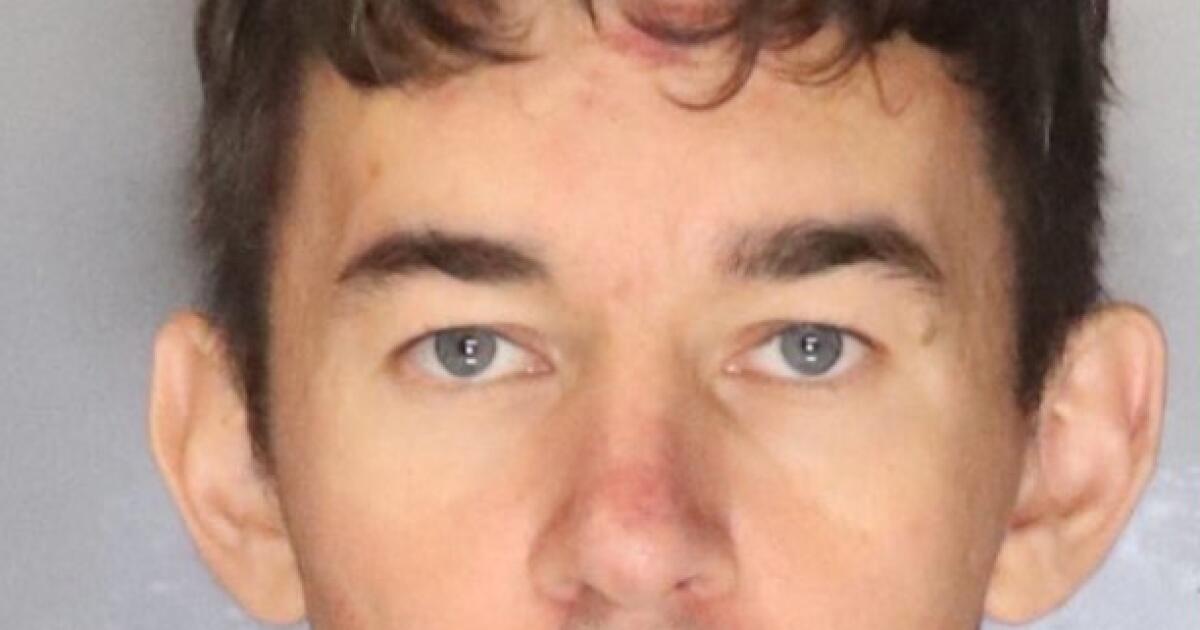YUCCA VALLEY, Calif. — If there were a Mojave Desert treasure map, it might lead you across the Morongo Basin and behind a shopping center. A sign promising “junk to gems” points the way. The hunt would end at a dusty plot where for decades vendors have gathered to sell everything from vintage Western wear to kitchen goods to crystal bowls.
Of course, locals never needed a map to find the Sky Village Swap Meet in this town of 21,700 people. Many recall its days as a drive-in movie theater. They remember eating at the Sky Village Cafe, where Anthony Bourdain once ordered chili, onions and eggs after a tequila-infused night at Pappy and Harriet’s, a barbecue restaurant and music venue nearby. They light up describing the bargains they’ve scored over the years.

The Yucca Valley swap meet has been in operation for more than five decades. Residents light up describing the bargains they’ve scored over the years.
“The thing you need to know about the swap meet is sometimes you come here and maybe you don’t find anything, but you have a good conversation somewhere,” said Yucca Valley shop owner Kime Buzzelli. Other times, she said, “Some guy needs to pay rent and he’s selling all of his turquoise jewelry. Once I got a whole bag of rare Egyptian pendants.”
But the swap meet closed suddenly last weekend after the family that owns the property was sued under the Americans with Disabilities Act. The complaint, filed in September in federal court in the Central District of California, alleged the owners failed to comply with federal and state standards related to parking spaces for people with disabilities and alleged additional barriers to accessibility would be identified after a site inspection.
The plaintiff, Darwin Boggs, has paraplegia and uses a wheelchair when traveling in public, the suit said. He has filed 71 ADA lawsuits this year including against a diner, a vegan restaurant and an animal feed store in the high desert. Boggs is represented by attorney Jason J. Kim of So. Cal. Equal Access Group, who has filed more than 2,300 ADA lawsuits this year.
Neither Boggs nor Kim responded to The Times’ request for comment.
Zena Carr, whose family has owned the swap meet for 35 years, said they expect to settle with the plaintiff, but they haven’t yet met to discuss the terms. They decided to close right away rather than upgrade the property, she said, because the cost to make the business ADA compliant — more than $200,000, she estimated — “wasn’t feasible.”
Carr said she and her 72-year-old mother had been planning to eventually sell the swap meet property. Her father, Bob Carr, the heart of the business, died in 2018, and Carr didn’t see herself running it long term. But the lawsuit early last month put the decision on high speed. Still, she said, the closure was bittersweet.
“Relationships have been made here,” she said. “Memories have been made.”



Max Hoegele, 82, looks for treasures one last time. A chalk board with final offers and a “thank you for the memories” on the swap meet’s final day of operation. (Gina Ferazzi/Los Angeles Times)
How ADA lawsuits can unfold
Autumn Elliott, litigation counsel for Disability Rights California, said federal and state disability laws are commonly enforced through individual lawsuits, because there is no government agency tasked with evaluating whether public locations are accessible or not.
“So when a lawsuit happens, it may be unwelcome by the business owner, but otherwise the business would just continue to be inaccessible to people with disabilities,” said Elliott, who was unable to comment specifically on the swap meet case.
Boggs visited the swap meet in June and alleged in the complaint that he encountered several barriers that interfered with his ability to access the business, including lack of proper signage marking accessible parking.
While the swap meet has parking for people with disabilities, the suit alleged that the business failed to provide a van accessible space, including an access aisle for wheelchair drop-off with a level surface.
“These barriers and conditions denied Plaintiff the full and equal access to the Business and caused Plaintiff difficulty and frustration,” the complaint said.
Dan Danet, an attorney with the Karlin Law Firm LLP who is representing the Carr family, said a lack of accessible parking, or accessible parking that doesn’t fully comply with the law, is “without a doubt the number one access barrier I see in complaints.”
He said the overwhelming majority of his cases end in early settlement. Under the state Unruh Civil Rights Act, plaintiffs can claim damages of at least $4,000 per visit to the business, plus attorney’s fees. The prospect of a site inspection, and the cost of addressing additional barriers, also incentivize early settlement, he said.
Some defendants have expressed concerns that serial lawyers and plaintiffs are taking advantage of the nearly 35-year-old federal law, seeking out violations and damages. But recently, a state bill failed that sought to alleviate damages for such lawsuits by providing 120-day warning notices to correct violations.
Elliott, of Disability Rights California, said her organization doesn’t support this type of warning, noting business owners have had several decades’ notice that they’re required to comply with the ADA. This kind of provision, she said, only serves to decrease a business’ incentive to proactively come into compliance.
“There is a lot of inaccessibility out there, which is a frustration to a lot of folks with physical disabilities,” she said. “Any solution that doesn’t involve businesses actually becoming accessible is not going to be equitable for people with disabilities.”
Heartbreak in the desert
In this high-desert region where people seek out solitude on five-acre plots of land, the market was a place to find weekly connections. At a time of rapid gentrification in the Joshua Tree area, it also provided a space for everyone to interact.
The swap meet represented “the joining of a few different worlds of people,” said Laurel Yancey, who was trying to sign up vendors for a Facebook page to keep in touch. Despite differences in politics, economics and life experiences, she said the marketplace was “almost that center point of the infinity sign … where two parts meet.”
When the Carr family bought the swap meet property in 1994, it had already been a drive-in movie theater and open-air market for decades. The Sky Drive-In Theater opened there in 1959, according to the Morongo Basin Historical Society. The weekend swap meet started operating in 1971.
After they stopped screening movies in 1997, Zena Carr said, the Carr family constructed cabins and other structures, where more permanent vendors could store their goods for a small fee. Tailgaters could rent a space on the bare ground — BYO table and shade — $30 for Saturday, and an additional $10 for Sunday.

The dilapidated Sky Village Swap Meet sign on the market’s last day of operation.
Bob Carr also built an odd treasure of his own on the property. Although closed years ago, the “Crystal Cave” started as a mini diorama of a small village of animals and houses in the cafe’s doughnut case, Zena Carr said. He eventually expanded it into a “meditative space made of foam, running water, passion, and thousands of crystals,” as Atlas Obscura described it.
In a town with a median household income of about $54,000, the swap meet has survived, in part, because it’s a strong buyer’s and seller’s market, Zena Carr said.
“It’s kind of a business that works in any scenario, as far as the economy goes,” Carr said. During the pandemic, and before that during the Great Recession, she said, “people were pulling stuff out of their garages to make money to pay their rent … or their car payment.”
For Stephanie Varga, a volunteer archivist with the Morongo Basin Historical Museum, it’s this staying power that made the swap meet so endearing. Flea markets these days are typically higher end or dominated by wholesalers, she said.
“It was dusty, and junky, and full of treasures,” she said. “It was a treasure hunt.”

The Yucca Valley swap meet survived for more than 50 years, in part because it’s a strong buyer’s and seller’s market, says Zena Carr, whose family has owned the property for 35 years.
Saying goodbye
On Sunday afternoon, Charlotte Burns browsed the swap meet while a man in a cowboy hat serenaded the crowd. She grew up in the high desert and says the market has hardly changed since the 1990s, when she recalls her mom buying her a Cabbage Patch Kids doll.
“I hope it doesn’t just turn into some gentrified market or something,” she said.
Randy Brill, who uses a wheelchair, sold goods for nine years at the swap meet, including NASCAR memorabilia, his old bicycles and snowboards, hand-carved signs and even Chihuahua puppies. He recalled that Bob Carr once built him a concrete ramp so he could vend from one of the permanent structures.

Randy Brill, who uses a wheelchair, sold goods at the swap meet for nine years. “It’s the heart of the community,” he says.
Brill, who now runs a monthly flea market in nearby Landers, predicted the vendors and buyers would survive.


Ramshackle buildings are cleared out. Cowboy boots for sale inside Dakota Bob’s Western Wear.
“Everybody will eventually pick up out of the dirt, dust themselves off,” he said. “That’s the character of a desert person. You’ve got to have hard skin to get through out here. Otherwise the desert will chew you up and spit you out.”
Inside Dakota Bob’s Western Wear — the largest permanent building at the swap meet — owner Margo Sturges also projected resilience.
When a customer expressed disappointment about the swap meet’s closure, Sturges replied warmly, “I do believe in God, and I do believe he has a better plan for us. And so I’m just waiting to see what opens up and what is going to be revealed.”
Sturges and her husband, 90-year-old Dakota Bob, have been fixtures at the swap meet for two decades. They started selling wagon wheels and teak twisted root furniture, but switched to vintage Western wear amid the recession. Over time, they’ve outfitted entire wedding parties in cowboy attire and have fit plenty of children for their first pairs of boots.
With the swap meet closing, Sturges said she and her husband are looking to sell their goods at a spot in Joshua Tree.
“He doesn’t gamble, he doesn’t drink, he doesn’t smoke, he doesn’t do drugs, he doesn’t chase women,” Sturges said. “But he does like to go shopping.”
With just 30 minutes left in the swap meet last weekend, more than a dozen people gathered around the stand where Hamid Moazzam has sold gems, crystals, handmade rugs and furniture for more than two decades.

Vendor Ruben Escobar packs away his merchandise as the Sky Village Swap Meet closes.
(Gina Ferazzi / Los Angeles Times)
As Moazzam lit some incense, his vending partner, Willow Murillo, prepared to perform a farewell sound bath with the crystal and Tibetan bowls that they had sold for many years.
“This is a little way of saying goodbye,” Murillo said.
She began drawing a wand around the circumference of the bowls, and their soothing vibrations sung out across the dusty market.
Then, silence.
Times researcher Scott Wilson contributed to this report. This article is part of The Times’ equity reporting initiative, funded by the James Irvine Foundation, exploring the challenges facing low-income workers and the efforts being made to address California’s economic divide.








Leave a Reply